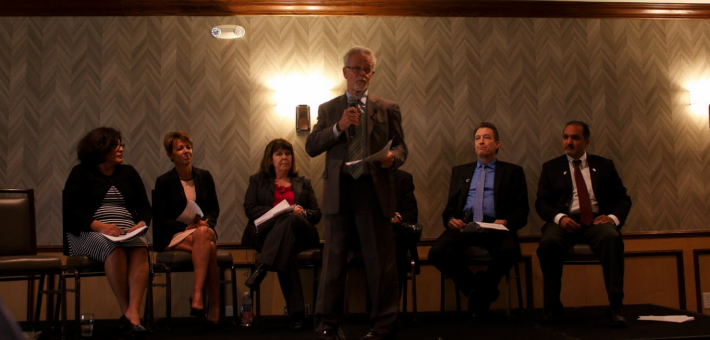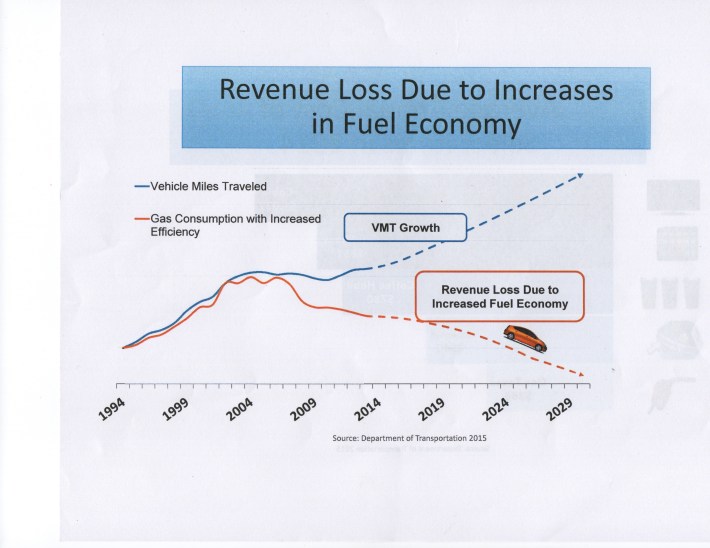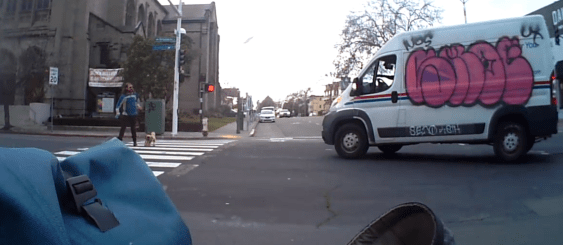
The California Transportation Committee, Fresno Chamber of Commerce, San Joaquin Valley Regional Transportation Agencies and Fresno Economic Development Corporation held their first of seven public forums in Downtown Fresno Wednesday on California’s transportation issues.
The forum, which aimed to discuss various funding projects for roads, highway development, and other transportation costs, was led by a panel of public officials and business leaders in the Central Valley and throughout California. The speakers stressed that this forum would not cover the ever-contentious High Speed Rail project, but rather infrastructure, bridges, roadways, and highways.
“The growth here in the valley is only going to accelerate. Which means the demand on the transportation network is only going to accelerate as well,” said Darius Assemi, Commissioner of the California Transportation Commission.
With 57 percent of California’s roadways requiring maintenance and rehabilitation, and 87 percent of counties in California with an average pavement rating of “at risk,” the committee hopes to implement short term and long term goals to address the issue.
“We know that the roadway and railway systems have had insufficient maintenance for the past few decades,” said Assemi.
Will Kempton, Executive Director of the California Transportation Commission, addressed the overall condition of California’s transportation system, particularly roads, streets, and highways.
“Our system, which I don’t have to tell anyone in this room, is not in very good shape,” said Kempton.
Kempton talked about the continual process of upgrading the Highway 99 Corridor, which was partly funded by Proposition 1B, a bond measure passed in 2006. He said that although parts of the highway look nice and have been improved, there are still extremely dangerous potholes and worn down parts of the roadway.
“We have a real problem. We have not invested in our existing infrastructure system adequately for many decades,” said Kempton.
Kempton said that by 2022, 25 percent of local street and road systems in California will be in “very poor condition” if additional revenue streams are not implemented. Additionally, 28 percent of California’s bridges are in need of repair.
One of the biggest challenges in generating funding is the declining effect of the gas tax in California, which has been one of the main ways the Department of Transportation pays for infrastructure projects and maintenance. Kempton says the increasing number of fuel efficiency cars is affecting this gas tax, along with the rate itself, which has not been raised since 1994.
“The existing gas tax has been the backbone of transportation funding for many years, and it’s been very effective,” said Kempton.
Although the number of new drivers and new cars on the road are increasing, as are the number of vehicle miles being driven by those drivers, the trend toward increasing efficiency will have the continual effect of reducing income brought in from the gas tax, according to the Department of Transportation.
“When your revenue structure depends on the consumption of fuel and the consumption of fuel goes down, it doesn’t bode well for the transportation system,” said Kempton.
One of the long-term alternative ideas to combat the loss of revenue from the gas tax is to create a “road charge” or mileage-based fee in California, which could include tolling or mileage- and timed-based fees on drivers. Kempton noted that Oregon and Washington are also creating pilot programs of road user chargers, and hopes to test this in California as well.
Two officials, Ahron Hakimi, Chair of the San Joaquin Valley Regional Transportation Agency, and Tony Boren, Executive Director of the Fresno Council of Governments, spoke specifically about how Fresno County and surrounding communities are impacted now and will be in the near future in regards to transportation development.
Boren asserted that the continual increase of population and the demand of the agriculture industry in Fresno County is directly linked to economic growth in the Central Valley.
“We believe in protecting and preserving our multibillion dollar investment in our transportation infrastructure, both urban and rural, [and that it] is critical to our region’s economic future,” said Boren.
Boren said that 95 percent of all transportation in Fresno County is by trucks and automobiles, so road maintenance and improvement is imperative. According to Boren, Fresno County has the largest rural road network in the state, close to 3,600 miles and 550 bridges.
Boren noted that the isn't just fixing cement and potholes, but that signage, street light repair, and proper drainage are also important.
“Without adequate road maintenance, our transportation infrastructure will cost five times as much to reconstruct, as compared to adequate preventive maintenance,” he said.






